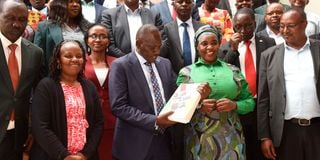Deepen technology adoption to grow own revenue

Uasin Gishu County Governor Jonathan Bii (holding book) with other officials during a press conference in Eldoret town on May 21, 2024.
What you need to know:
- The performance of Homa Bay and Muranga counties came in for particular praise.
- Both have joined the rare league of counties raising above Sh1 billion in OSR per year.
Own source revenue (OSR) is a result of service delivery. Therefore, we should deepen technology adoption to improve service delivery, reform the human side, and exercise all our constitutional powers and functions.
These are some of the conclusions of a two-day OSR conference addressed by five governors, the Controller of Budget and a galaxy of experts, including Yours Truly.
Here is what happened.
Hundreds of senior officials gathered in Nairobi mid-week to consider best practices in county resource mobilisation. The conference, organised by the private sector with support of the State Department for Devolution and the Council of Governors, was a first.
The senior officials were from Homa Bay, Muranga, Meru, Nairobi, Kakamega, Kiambu, Nakuru, Garissa, Nyandarua, Nyamira, Kilifi, Taita Taveta, Mombasa, Kisii, Nyeri, Laikipia, Migori, Samburu, Kitui, Isiolo and Makueni counties.
The performance of Homa Bay and Muranga counties came in for particular praise. Both have joined the rare league of counties raising above Sh1 billion in OSR per year. And they have done so in a remarkably short period of time.
Unlike nationally raised tax revenue, own source revenue accrues from service provision. Citizens pay for a service, such as water, artificial insemination, meat inspection, a parking space, or health services.
As a result, improvements in OSR come from two broad areas. Improvements in the service, and better collection. Both are greatly aided by technology.
Improvements can mean providing more services. This is most evident in the health sector, where the push is for more services offered as closest to the citizen as possible.
Going cashless
Today, dispensaries offer maternity and laboratory services. In days past, these fee attracting services were only in the facilities now called county referral hospitals.
But it can also mean better, more efficient services. Counties are now paying attention to the look and feel of facilities, and to patient flow to shorten the time it takes to get treatment.
Last month, the Controller of Budget released the third quarter County Governments Budget Implementation Review Report for the first nine months of the financial year 2023/24.
Counties generated Sh41.4 billion in own source revenue in that period. Of this, an average of 28 per cent came from the facility improvement fund – that is user fees we pay at health facilities.
FIF makes up more than 50 per cent of own source revenue in the counties achieving the fastest OSR growth, such as Homa Bay and Muranga.
Better collection means eliminating leakages, making it easier for citizens to pay, and improving revenue tracking. It also means covering all the county functions and powers stipulated by schedule four of the Constitution.
This is where technology comes in. Cash handling has serious moral hazards, so counties are encouraged to go cashless.
Automated building plan approvals make it easier for the customer to pay, creates efficiency and eliminates leakage.
Integrated county revenue system
The Homa Bay story was the highlight of the conference. The county has collected Sh1.12 billion in revenue in the 11 months ending May. This, from Sh160 million per year 20 months ago.
Improved service delivery, a revenue board, going cashless, automation and the monthly revenue roundtable are key reforms by Governor Gladys Wanga, that have led to this growth.
The Controller of Budget explained the benefits of the ongoing switch from cash to accrual accounting. In the latter, both revenues and expenses are reported in the period they occur, thus presenting a county’s financial position more accurately.
Technology featured prominently in the conference. The big providers Craft Silicon, Safaricom, IntSoft, and Smart Applications were all in the room.
The proposed integrated county revenue system generated heated debate. County staff felt that their colleagues in national government who make policy affecting counties have little experience in county operations.
At length, the conference concluded that a good revenue system mirrors and maps service delivery, and creates convenience for the citizen.
Counties need innovative resource mobilization, and run of the mill investment conferences won’t do. Counties need to be investor ready. OSR growth is part of that readiness, and key to structured financial transactions.
Such is the case with the on-going tenant purchase delivery of a headquarter complex in Homa Bay. Strong revenue growth convinced the County Pension Fund to develop the building, with Homa Bay paying for it over several years.
Waiver of interest and penalties
Such transactions require both financial and legal structuring. County legislation is necessary to ring-fence repayment cashflows, giving investors comfort.
Repayment is a particularly thorny issue, as investors perceive high political risk among counties – will succeeding county governments honour commercial contracts they find in place?
Legislation is also required more broadly, to underpin OSR collection and regulate popular moves like waiver of interest and penalties on property taxes. Observers worry that such waivers are all too often a political tool.
As the conference was going on, the Gen Zs had taken over the streets of Nairobi and several major towns, protesting the punitive Finance Bill 2024.
The anger is partly driven by the view that a wasteful national government is not delivering on its promises nor value for the taxes they are imposing.
OSR is fees for service, the county executives carefully emphasized, perhaps worried that the anger could spill over to the devolved level. But clearly, the revolution will not be televised, it will be on tiktok.
@NdirituMuriithi an economist, is partner at Ecocapp Capital





